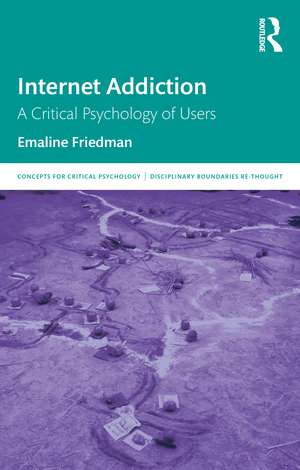Internet Addiction: A Critical Psychology of Users: Concepts for Critical Psychology
Autor Emaline Friedmanen Limba Engleză Paperback – 31 dec 2020
Friedman explores the limitations of individual-centered remediations exemplified in the psychology of internet addiction. Furthermore, Friedman outlines the self-creative actions of social media users, and the data processing that exploits them to urge psychologists to politicize rather than pathologize the effects of excessive net use. The book develops a notion of capitalist imperialism of the social web and studies this using the radical methods of philosopher Gilles Deleuze and psychoanalyst Félix Guattari.
By synthesizing perspectives on digital life from sociology, economics, digital media theory, and technology studies for psychologists, this book will be of interest to academics and students in these areas, as well as psychologists and counselors interested in addressing Internet Addiction as a collective, societal ill.
| Toate formatele și edițiile | Preț | Express |
|---|---|---|
| Paperback (1) | 191.23 lei 3-5 săpt. | +12.24 lei 6-12 zile |
| Taylor & Francis – 31 dec 2020 | 191.23 lei 3-5 săpt. | +12.24 lei 6-12 zile |
| Hardback (1) | 1004.55 lei 6-8 săpt. | |
| Taylor & Francis – 31 dec 2020 | 1004.55 lei 6-8 săpt. |
Din seria Concepts for Critical Psychology
-
 Preț: 293.58 lei
Preț: 293.58 lei - 5%
 Preț: 273.43 lei
Preț: 273.43 lei -
 Preț: 110.27 lei
Preț: 110.27 lei -
 Preț: 278.26 lei
Preț: 278.26 lei -
 Preț: 301.32 lei
Preț: 301.32 lei -
 Preț: 287.67 lei
Preț: 287.67 lei - 5%
 Preț: 264.67 lei
Preț: 264.67 lei -
 Preț: 294.42 lei
Preț: 294.42 lei -
 Preț: 294.74 lei
Preț: 294.74 lei -
 Preț: 285.95 lei
Preț: 285.95 lei - 18%
 Preț: 995.54 lei
Preț: 995.54 lei -
 Preț: 358.19 lei
Preț: 358.19 lei - 18%
 Preț: 1000.27 lei
Preț: 1000.27 lei -
 Preț: 387.65 lei
Preț: 387.65 lei - 5%
 Preț: 363.20 lei
Preț: 363.20 lei - 18%
 Preț: 999.12 lei
Preț: 999.12 lei -
 Preț: 347.76 lei
Preț: 347.76 lei -
 Preț: 348.18 lei
Preț: 348.18 lei - 17%
 Preț: 236.10 lei
Preț: 236.10 lei -
 Preț: 416.22 lei
Preț: 416.22 lei -
 Preț: 359.17 lei
Preț: 359.17 lei -
 Preț: 358.56 lei
Preț: 358.56 lei - 18%
 Preț: 993.49 lei
Preț: 993.49 lei -
 Preț: 361.08 lei
Preț: 361.08 lei - 18%
 Preț: 1157.34 lei
Preț: 1157.34 lei - 18%
 Preț: 1109.18 lei
Preț: 1109.18 lei - 18%
 Preț: 1106.02 lei
Preț: 1106.02 lei - 18%
 Preț: 994.14 lei
Preț: 994.14 lei -
 Preț: 345.89 lei
Preț: 345.89 lei - 20%
 Preț: 242.61 lei
Preț: 242.61 lei - 18%
 Preț: 993.97 lei
Preț: 993.97 lei -
 Preț: 361.08 lei
Preț: 361.08 lei -
 Preț: 364.10 lei
Preț: 364.10 lei -
 Preț: 344.90 lei
Preț: 344.90 lei
Preț: 191.23 lei
Nou
Puncte Express: 287
Preț estimativ în valută:
36.59€ • 38.41$ • 30.37£
36.59€ • 38.41$ • 30.37£
Carte disponibilă
Livrare economică 21 martie-04 aprilie
Livrare express 06-12 martie pentru 22.23 lei
Preluare comenzi: 021 569.72.76
Specificații
ISBN-13: 9780367172954
ISBN-10: 036717295X
Pagini: 130
Dimensiuni: 138 x 216 x 24 mm
Greutate: 0.16 kg
Ediția:1
Editura: Taylor & Francis
Colecția Routledge
Seria Concepts for Critical Psychology
Locul publicării:Oxford, United Kingdom
ISBN-10: 036717295X
Pagini: 130
Dimensiuni: 138 x 216 x 24 mm
Greutate: 0.16 kg
Ediția:1
Editura: Taylor & Francis
Colecția Routledge
Seria Concepts for Critical Psychology
Locul publicării:Oxford, United Kingdom
Public țintă
Postgraduate and UndergraduateCuprins
Preface by Ian Parker
Chapter 1
Introduction
Chapter 2
A Brief Take on "Internet Addiction" in Psychology
Chapter 3
Schizoanalysis, Technology, and Sociality
Chapter 4
Users and Technologies of Self
Chapter 5
Extraction Machine of Social Media
Chapter 6
Data Collection and the Relational Factory
Chapter 7
Conclusion
Chapter 1
Introduction
Chapter 2
A Brief Take on "Internet Addiction" in Psychology
Chapter 3
Schizoanalysis, Technology, and Sociality
Chapter 4
Users and Technologies of Self
Chapter 5
Extraction Machine of Social Media
Chapter 6
Data Collection and the Relational Factory
Chapter 7
Conclusion
Notă biografică
Emaline Friedman, Ph.D., is an independent scholar and psychosocial theorist. Her research interests cover all forms of digital control and exploitation: data capitalism, platform labor, AI-enabled bigotry, and software cultures. She works on distributed ledger technologies to steer networked social organization toward human solidarity initiatives, environmental regeneration, and other forms of commoning.
Recenzii
"There may be no more pressing matter for the emerging world of 21st century capitalism than the question of addiction. Up until now, the current array of theoretical formulations for addiction as a concept and social set of practices, both remediative and explanatory, have been of limited utility. This volume offers an innovative and convincing intervention into how we might think of addiction as an integral aspect of contemporary capitalist logic and as a way of understanding emerging modes of alternative engagements that may offer new worlds and new peoples. Utilizing Deleuzo-Guattarian schizoanalytics the book offers both overdue new methodological tactics of inquiry as well as introducing addiction as a social configuration rather than an individual pathology. The proposals for new forms of sociality and subjectivity offer life affirming alternatives to the death drive of late stage capitalism."— Hans Skott-Myhre, Professor of Human Services, Kennesaw State University, USA
Descriere
This important book questions the psychological construct of Internet Addiction by contextualizing it within the digital technological era. It proposes a critical psychology that investigates user subjectivity as a function of capitalism and imperialism, arguing against punitive models of digital excesses.
